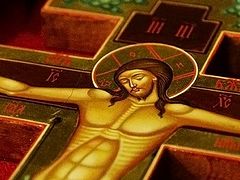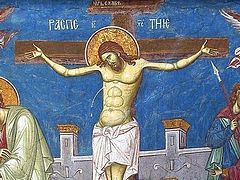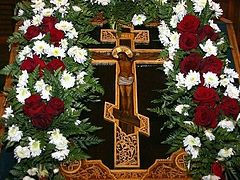Today, on the Elevation of the Precious and Lifegiving Cross of the Christ, we present stories about how within the experience of death, Pascha is suddenly revealed.
“How can a dead Body hanging on the Cross be the King of Glory?”
Metropolitan Nicholas of Mesogaia and Lavreotiki of the Greek Orthodox Church:
I remember, when I was still a student in America, I was walking down the street one day, completely melted from the midday heat… It was the height of summer. The shade, should it happen to fall from the low, cramped houses, was seized by the greedy embrace of the picket fences separating private properties. I was exhausted, and suddenly I saw a small building, and inside—the coveted semi-darkness of shade … There it was! A small, cool voice (3 Kg./1 Kg. 19:12).[1] I didn’t know these words then, I simply found myself inside—there was no fence—and I was revived; right in front of a huge Crucifix.
“The Lord of Glory” read the title on the Cross. “How can a dead Body hanging on the Cross be the Lord of Glory? Either it’s a hoax, or there is some great mystery here…” I was perplexed. There, in a small Orthodox chapel, where everything was deliberately done, it seemed to me then, in some kind of retro style from two centuries ago, I went out into open space: A feeling that none of even the newest instruments used by a NASA employee could give.[2] The ground simply disappeared out from under my feet, and time distinctly stopped.
 Metropolitan Nicholas of Mesogaia and Lavreotiki
Metropolitan Nicholas of Mesogaia and Lavreotiki
It was something new…
I thought of myself as a scientist then. My life was full of scientific research and achievements. There were no unsolvable tasks for me, until I found myself on this hot afternoon in front of the Crucified Christ Himself…
Now, even if I’m walking down the street and it’s 104 degrees and everyone all around even wants to remove their skin because of the heat, I will be glad for my riassa and won’t take it off for anything! A foreigner even inquired of me once: “What, are you cold? Why are you dressed like that?” I replied that now I can find coolness even in the scorching sun, which went dark when Christ was crucified! (cf. Lk. 23:45).
To understand this truth, you have to let it enter within. The problem of modern man is that he has a hypertrophied mind and an atrophied heart. People even feel logically today—and this is the enslavement of the spirit of this world. But the Gospel allows man to think with his heart. The last shall be first (Mt. 19:30, Mk. 10:31, Lk. 13:30); he that is greatest among you, let him be as the younger (Lk. 22:26); for whosoever will save his life shall lose it (Mt. 16:25). How can this be understood?!
When something unjust happens to us, we grumble and resist: “Why did this happen to me?!” We completely forget that the main thing that should happen to us—SALVATION—is based on the greatest of injustices—the Crucifixion of Jesus, the Son of God, our Lord.
The just curse is lifted from us sinners through the condemnation of the Sinless One by an unjust judge.
This is the logic of the Gospel; it is different. It overshadows you only through the acceptance of the Cross of Christ with your entire being.
Why the demon-possessed and those far from the Church fear the Cross
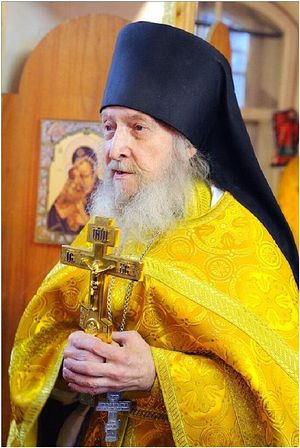 Hieroschemamonk Valentin (Gurevich) Hieroschemamonk Valentin (Gurevich), confessor of Moscow’s Donskoy Monastery:
Hieroschemamonk Valentin (Gurevich) Hieroschemamonk Valentin (Gurevich), confessor of Moscow’s Donskoy Monastery:
At one time, when Archimandrite Naum (Baiborodin) blessed me to read the 500,[3] I was suddenly asked to live at the Elevation of the Cross Church in the village of Tatarintsevo (not far from Bronnits). Inasmuch as the rector of the church, Archpriest Mikhail Stepanov, aka Hieromonk Misail, and later Hieroschemamonk Raphael, was a spiritual child of Fr. Naum, I decided it would be in accordance with the guidance I was given, and life at the church would help my Church life.
I went to the parish directly from the world; I was raised in a family that was quite far from and alien to the Russian Church, and the spirit of this world was fully present in me at that time, which was, of course, obvious to the rector. Therefore, I wasn’t allowed into the altar, and so I wasn’t an altar server there.
I helped with the repairs and construction work and sang and read on the kliros at the daily services.
Since this was a church of the Elevation of the Cross, they had a wonderful old Crucifix. I venerated it every day. I understand why the demon-possessed and people who are far from the Church fear the Cross—because it is death, but it is foretold and inevitable (cf. 2 Pet. 3:7). However, if a man lives by his lusts and passions, then death frightens him, because the Cross kills everything by which, in which, and of which his life consists.
I remember I was so bewildered: “How is it possible to kiss this symbol of death, even the very essence of death?” I also felt some kind of internal resistance. Nevertheless, understanding that it was an integral part of the “soul-profiting Church ritual” (as I formulated it for myself then), I forced myself, venerated the Cross, and gradually began to clearly feel that it gives healing to the soul, expels from it that which is foreign—a death-bearing worldly taint—and the soul is corrected.
This correction of the soul was conduced by yet another circumstance. The rector of this Elevation of the Cross Church, Fr. Mikhail, was known throughout the entire Moscow Patriarchate for not abbreviating kathismas[4] at all. He would say: “When the Psalter is read, the demons are nauseous.”
More than once, the church warden, fulfilling the religious affairs commissioner’s instructions, tried under various pretexts to persuade Fr. Mikhail that he had to abolish this activity and shorten the kathismas. How he didn’t beg, what arguments he didn’t bring forth! He had, they insisted, to adapt to the busy schedule, so that the old women from the neighboring villages would be able to leave after the evening service in time, otherwise they would have to spend the night on the floor of the church. But he wouldn’t agree at all: “The demons are nauseous! I will not cut anything!”
For me, having just come to the Church from the world, this approach of Batiushka’s, as well as the chance to venerate the Cross, was very welcome. The spirit of the world opposes the Holy Spirit, but the Holy Spirit triumphs by the power of the Cross; and it was precisely by the Holy Spirit that the Psalter was written. When King Saul was tormented by an unclean spirit, he ordered for David to be called, who sang psalms, accompanying himself on the lyre, and the unclean spirit flew away from its royal prey…
When I was there day in and day out, I read everything in its fullness, in accordance with how the Typikon prescribes the kathismas to be read, and my soul, just like in venerating the Crucifix, became healthier and was set straight…
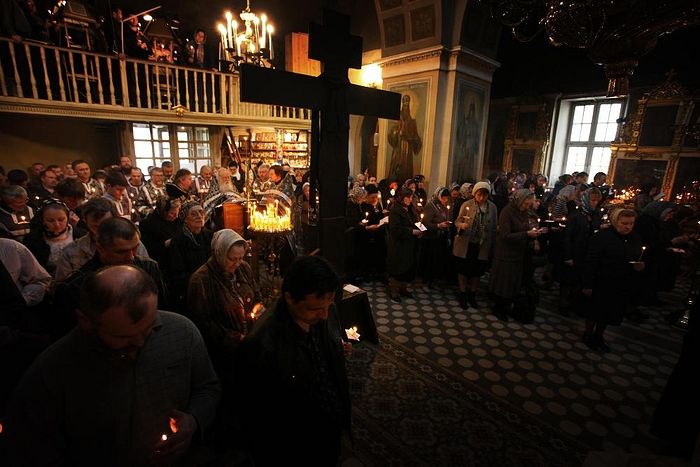 The Cross in the Church of the Protection of the Most Holy Theotokos in Otradnoe, where Archpriest Valerian Krechetov serves
The Cross in the Church of the Protection of the Most Holy Theotokos in Otradnoe, where Archpriest Valerian Krechetov serves
I would also go to the parish in Otradnoe, to Fr. Valerian Krechetov, where several incidents connected with the power of the Cross of Christ also occurred that made a great impression upon me. I remember, there was one girl there, an artist. She was a drug addict and possessed. One day I saw this scene: She confessed, and then, when after the prayer of absolution she was supposed to kiss the Cross and Gospel, she forced herself to do it, trying to bow her head with all her strength, but as soon as her mouth drew near to the Cross, her head completely turned 180 degrees around in some completely unnatural, frightful way, so that her face was where the nape is. That is, it seems the phrase “turn back” was probably originally used in the literal sense: It is an evil spirit that turns the possessed one back from the Cross.
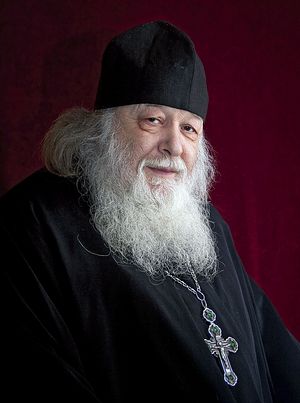 Archpriest Valerian Krechetov Don’t be afraid, but I’m going to tell you one more story, about another possessed person. Demoniacs especially often reveal their possession in a strange manner in especially grace-filled places. This can be observed, for example, in the Holy Trinity-St. Sergius Lavra, or at the Pskov Caves Monastery. It also happens at the Holy Protection Church in the village of Akulov…
Archpriest Valerian Krechetov Don’t be afraid, but I’m going to tell you one more story, about another possessed person. Demoniacs especially often reveal their possession in a strange manner in especially grace-filled places. This can be observed, for example, in the Holy Trinity-St. Sergius Lavra, or at the Pskov Caves Monastery. It also happens at the Holy Protection Church in the village of Akulov…
The possessed woman in question fell unconscious twice during the service—the first time immediately after Communion, and the second time when Batiushka gave the Cross to kiss after Liturgy. I remember one choir director (from Fr. Dmitry Smirnov’s church, he just happened to be there) and I picked her up from the floor, as she had fallen down unconscious; Batiushka placed the Cross on our heads and we carried her to the bench standing against the western wall at the St. Nicholas altar on the right side. They laid her there, face to the wall; she lay there completely motionless, flat. For some reason it occurred to me to make the Sign of the Cross over her, though at the same time, I felt some kind of internal resistance. But still, I overcame myself and crossed her. And at that exact moment, when I made the Sign of the Cross, I felt that something within me move, and at the same time the woman, who until then was lying without any signs of life, also suddenly jumped up with her whole body and cried out. And what was surprising was that she didn’t see me making the Sign of the Cross over her! She was lying with her face to the wall and her eyes were closed, but precisely when I crossed her, she was tossed into the air. And at the same time, everything shuddered within me—some strange unity arose between me and her at that moment… Then I felt how real the power of the Sign of the Cross is.
When Protestants starting “protesting” against the Cross, asking why should we deify the instrument of execution, and saying if the Lord were shot with a gun you would start worshiping a gun, and so on, it is absolutely absurd for someone who has felt the power of the Cross by the grace of God. The enemy works through them, to make them deny the Cross.
I also remember another incident, later. I had hives on my legs for a while. It was very itchy, and they wouldn’t go away. I went to the doctor and he sent me to the dermatology clinic, where I was prescribed some ointment. For a month I regularly put it on the affected spots, but nothing worked.
Then one day I went to the Church of All Saints by the Sokol metro station. They were bringing out the Cross on the feast of the Exaltation. And I remember the priest carrying the Cross, beautifully decorated with flowers, accompanied by very beautiful singing from the kliros, and over the Cross I clearly saw a glow. It was all so striking, and then I had the distinct thought that now, when the priest lays the Cross on the analogion, I’ll go up and kiss it and be healed. That’s what I did. Having arrived home that evening, I didn’t even check anything; I just lay down to sleep, completely exhausted from the difficult day. I woke up the next morning, examined my legs, and not a single trace of the hives remained!
There are miracles in everybody’s life today—it’s just that the noise that the demons deliberately drive people into often prevents our contemporaries from being attentive to that which can save them—and not only in this life, but most importantly, for eternal life.
The Cross is given to us to glorify the Resurrection of Christ
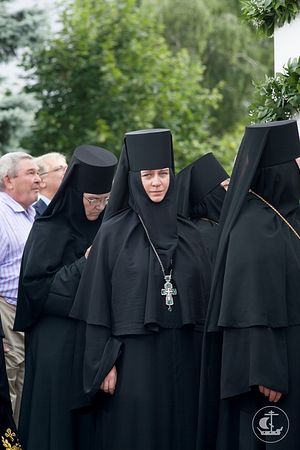 Abbess Sophia (Silina) Abbess Sophia (Silina) of Holy Resurrection-Novodevichy Monastery in St. Petersburg:
Abbess Sophia (Silina) Abbess Sophia (Silina) of Holy Resurrection-Novodevichy Monastery in St. Petersburg:
Before the church at the Holy Resurrection-Novodevichy Monastery was returned, we would go see Fr. Nikolai Guryanov on the island of Talabsk. The monastery churches were still in a state of desecration, and there were even latrines there, and some machine tools were installed. We would sometimes take pictures of this disgrace to show Batiushka.
One day he said: “What a beautiful monastery! It’s your monastery! Matushka, stand by it.” And he began to sing the hymn: “Before Thy Cross, we bow down in worship, O Master, and Thy holy Resurrection we glorify.”
We thought then: Here’s the Elder praying to the Cross of Christ, and the monastery is on its own Golgotha, ruined… Could such fulfilled hope really have quietly made its way into him in some miraculous manner? When would we glorify the Resurrection? It is the Monastery of the Resurrection…
But this is why Batiushka was clairvoyant. His hymn to the Cross, from out of the blue, was in fact a foretelling of the time when the monastery would be returned to the Church, because the official date of the monastery’s transfer occurred in the week of the Elevation of the Cross, when the Cross of the Lord lies on the analogion in the center of the church. Then, in the presence of our ruling hierarch Metropolitan Vladimir (Kotlyarov) of St. Petersburg and Ladoga, before the Cross of Christ, the glorification of the Cross was celebrated and the documents on the transfer of the monastery were handed over.
Fr. Nikolai had always rejoiced in every little stroke, in the details that testified to the approach of this hour, when the monastery would be returned to the Church. Any information about living Russian monasteries was gratifying for him in general. Batiushka would pray for the benefactors and the monastics. The ideal of holiness is indestructible in the heart of the Russian people, in the Russian soul. Many remember the scene from the film when they ask Fr. Nikolai: “How can we revive Holy Rus’?” to which he smiled in his usual manner and answered: “It hasn’t died!” God isn’t in the logs, but in the ribs.[5]
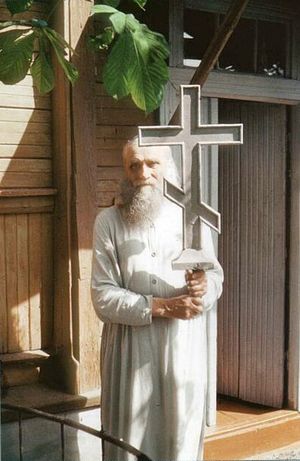 Archpriest Nikolai Guryanov I know that when someone has a special spiritual battle, about which path to take, God Himself advises the weakest about which way leads to salvation. I remember when in the most crucial period of my life, another, then-unknown-to-me elder appeared to me in a dream. Only later did I realize who it was by the portrait hanging at the St. Petersburg Theological Academy where I teach! I suddenly stopped on the image of Metropolitan Anthony (Melnikov; † 5/29/1986) and I realized it was precisely this spirit-bearing archpastor that appeared to me… He had already reposed by then. I already knew that he had not been tonsured into the schema during his lifetime, although he came to me in the schema. “Upon meeting with Christ, the schema will be removed from one person and laid upon another,” says St. Paisios the Athonite. We don’t know who will stand before the Lord in what rank. The great schema is with God—the schema of the spirit that a man acquired during his life.
Archpriest Nikolai Guryanov I know that when someone has a special spiritual battle, about which path to take, God Himself advises the weakest about which way leads to salvation. I remember when in the most crucial period of my life, another, then-unknown-to-me elder appeared to me in a dream. Only later did I realize who it was by the portrait hanging at the St. Petersburg Theological Academy where I teach! I suddenly stopped on the image of Metropolitan Anthony (Melnikov; † 5/29/1986) and I realized it was precisely this spirit-bearing archpastor that appeared to me… He had already reposed by then. I already knew that he had not been tonsured into the schema during his lifetime, although he came to me in the schema. “Upon meeting with Christ, the schema will be removed from one person and laid upon another,” says St. Paisios the Athonite. We don’t know who will stand before the Lord in what rank. The great schema is with God—the schema of the spirit that a man acquired during his life.
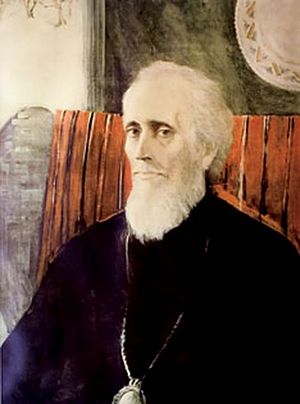 Metropolitan Anthony (Melnikov) And here the schema-metropolitan spoke with me, strengthening me in choosing the monastic path. I agreed. And then, suddenly, I was given Vladyka Anthony’s paramon[6] with the inscription: For I bear in my body the marks of the Lord Jesus. I was tonsured with this paramon. Such a blessing was given to me at my tonsure from that world where everyone is alive to God (cf. Mt. 22:32).
Metropolitan Anthony (Melnikov) And here the schema-metropolitan spoke with me, strengthening me in choosing the monastic path. I agreed. And then, suddenly, I was given Vladyka Anthony’s paramon[6] with the inscription: For I bear in my body the marks of the Lord Jesus. I was tonsured with this paramon. Such a blessing was given to me at my tonsure from that world where everyone is alive to God (cf. Mt. 22:32).
Later, when the monastery had been returned to the Church and its monastic life began to warm up, it was very hard for me to bear the cross of the abbacy for a while: My passions still arose and it was hard to endure the infirmities of others… Then I wrote a letter to Fr. John (Krestiankin). I cried it all out, and the answer just wasn’t coming. “There was nothing to send in the mail,” I thought. “Batiushka probably has no time…” I had begun to despair when suddenly news came from him! I opened the envelope and there was a photo of a rock on which was depicted St. Seraphim of Sarov praying with upraised arms—we know that the arms of the ascetics are not uplifted as being elevated to Heaven, but on the contrary, they’re being spread on the crossbeam of the Cross, accepting all the pain and confusion of this world… I turned the picture over, and there on the other side was written in Batiushka John’s hand: “Matushka, the Light of the Risen Christ is seen only from the Cross.”
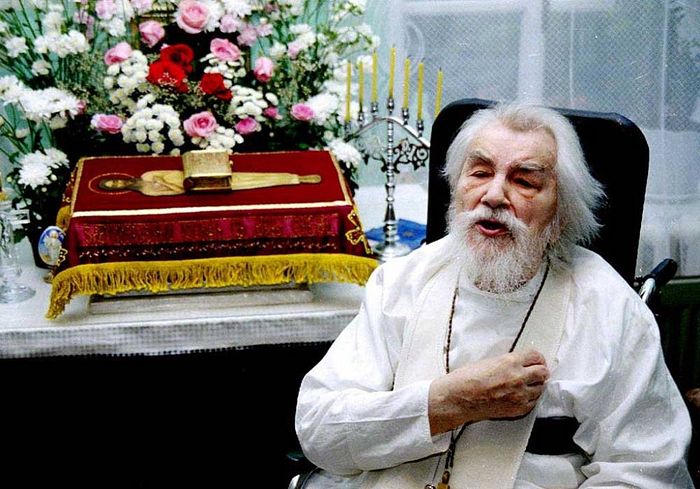 Archimandrite John (Krestiankin)
Archimandrite John (Krestiankin)
Then, once again was revealed the prophecy of Fr. Nikolai. Thus we glorify the Resurrection of Christ in Holy Resurrection Monastery. Glory to God for all things.


